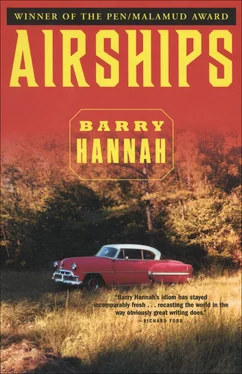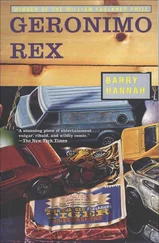“I think I’d hold by that,” said Stuart.
“You shit! What are we doing killing people in Pennsylvania?” I screamed.
“Showing them that we can, Captain Howard!”
They arrested me and I was taken back (by the nightways) to a detention room in North Carolina. But that was easy to break out of.
I rode my horse, another steed that knew me, named Vermont Nose.
I made it across the Mason-Dixon.
Then I went down with Grant when he had them at Cold Harbor and in the Wilderness. My uniform was blue.
I did not care if it was violet.
I knew how Stuart moved. We were equal Virginia boys. All I needed was twenty cavalry.
I saw him on the road, still dashing around and stroking his beard.
“Stuarrrrrrrrt!” I yelled.
He trotted over on his big gray horse.
“Don’t I know this voice?” he said.
“It’s Howard,” I said.
“But I sent you away. What uniform are you wearing?”
“Of your enemy,” I said.
They had furnished me with a shotgun. But I preferred the old Colt. I shot him right in the brow, so that not another thought would pass about me or about himself or about the South, before death. I knew I was killing a man with wife and children.
I never looked at what the body did on its big horse.
Then Booth shot Lincoln, issuing in the graft of the Grant administration.
I am dying from emphysema in a Miami hotel, from a twenty-five-year routine of cigars and whiskey. I can’t raise my arm without gasping.
I know I am not going to make it through 1901. I am the old guy in a blue uniform. I want a woman to lie down for me. I am still functional. I believe we must eradicate all the old soldiers and all their assemblies. My lusts surpass my frame. I don’t dare show my pale ribs on the beach. I hire a woman who breast-feeds me and lets me moil over her body. I’ve got twenty thousand left in the till from the Feds.
The only friends of the human sort I have are the ghosts that I killed. They speak when I am really drunk.
“Welcome,” they say. Then I enter a large gray hall, and Stuart comes up.
“Awwww!” he groans. “Treason.”
“That’s right,” I say.
In 1900 they had a convention of Confederate veterans at the hotel, this lonely tall thing on the barbarous waves. I was well into my third stewed mango, wearing my grays merely to be decorous. I heard a group of old coots of about my age hissing at a nearby table. It became clear that I was the object of distaste.
I stood up.
“What is it?” I asked them.
I was answered by a bearded high-mannered coot struck half dead by Parkinson’s disease. He was nodding like a reed in wind. He rose in his colonel’s cape. Beside him his cane clattered to the floor.
“I say I saw you in the road, dog. I’m a Virginian, and I saw it by these good eyes. You killed Jeb Stuart. You ! Your presence is a mockery to us of the Old Cause.”
“Leave me alone, you old toy,” I said.
I raised my freckled fists. His companions brought him down.
When the convention left, I dressed in my grays again and walked to the beach. Presently Charlie came out of the little corral over the dune, walking Mount Auburn’s grandchild. If President Grant lied to me, I don’t want to know. I have proof positive that it came from a Pennsylvania farm in the region where we foraged and ambushed.
It was an exquisitely shouldered red horse, the good look in its eye.
Charlie let me have the rein and I led the animal down to the hard sand next to the water. It took me some time to mount. My overcoat fell over his withers.
“You need any help, Captain Howard?” Charlie asked.
“I don’t need a goddamned thing except privacy,” I said.
There was nothing on the beach, only the waves, the hard sand, and the spray. The beauty I sat on ran to the verge of his heartburst. I had never given the horse a name. I suppose I was waiting for him to say what he wanted, to talk.
But Christ is his name, this muscle and heart striding under me.
The other day we cornered a man, a lout named Reggy John. It was in a barn near the Kansas and Missouri border. The weather was freezing and moist. John was unarmed and covered with cow manure. We had shotguns, but I saw this creature under the straw and took pity on him. I told the guys to lay their guns down. In a stall was his supposed sweetheart, tied underneath a bull with rope, all naked. One of the boys had blown off the latch of the stall so the bull was wandering about among us with the woman under him. The bull seemed to be tranquil, having had his last desire with the woman.
Sheriff Folger lost his reason and grabbed the pitchfork from the wall and stuck it in the bull’s eyes. We forgot the criminal and kept to the sides of the barn, watching the bull with gore spewing from its sockets. The woman underneath him was awakened by the jumping. The bull twisted so in its death that the ropes were loosened and the beast could kick her in the head. He did it in his throes, kicked her out of bondage entirely. We couldn’t stand any more. Sergeant Leet shot the thing in the brain with his shotgun. It was at peace.
We were all hungry after the big hunt. Under Leet’s direction, three of the privates skinned the bull, three others started the fire. One made coffee, two brought in potatoes and the kettle, and a corporal brought in a sack full of onions and cabbages from the farmer’s house, to boil with the potatoes. The farmer came along. We sent him back for salt and pepper. We hadn’t eaten anything substantial in five days. The farmer was smiling. He wanted to introduce us to his wife and children. The barn was getting warmer and warmer. When the farmer opened the door, I saw the snow was coming down in big tumbling flakes. The degree was zero.
Leet directed three of the privates to knock out a hole in the roof so the smoke could get out of the barn, and it was done.
They had slabbed the meat and were turning it on the coals with their own little implements or such as they could pick up in the barn. Leet and I watched the men eat. The sheriff was using the pitchfork he’d used on the bull. Somebody had thrown a horse blanket over the woman, who by report was named Elizabeth (Betsy) Allen, from New Albany, Mississippi. The kettle was bubbling with potatoes, cabbages and onions. Coffee was boiling high. The aromas were thick. I pulled my last cigarette from my jacket. The filter was broken off but I lit the shredded end. I thought: This is delicious. The smoke went down in my lungs and touched all the big hollow parts of me. I was hungry and began feeling somewhat lecherous. But I had been so long without food, I did not want food; and I had been so long without a woman, I did not want a woman.
Farmer Lutz brought out his wife and children. His wife was blond and ugly, but his children were beautiful like elves. The wife looked straight at me with astonishment. I’m tall and lean and rather young for a colonel.
Lutz wanted to know what we were going to do with John and his sweetheart. The woman was sitting up, holding the blanket over her chest. Her face was bruised so much. You could tell she was a dyed blonde from her secret hair. The odor of bull discharge was strong on her. She was, however, being treated well by the corporal, Wooten, who had her sipping coffee. He was treating her tenderly, but for my money it was the wrong drug. Coffee would make her wake up and talk. I didn’t want to hear what she would say.
“We’re going to do them justice,” I told Lutz.
Sergeant Leet gave him five hundred cash for the use and damage of his barn.
“Keep it,” said farmer Lutz. “It was worth the thrill.”
But the wife snatched the money. She was looking straight at me. Something both of anger and of desire was in her stare.
Читать дальше












